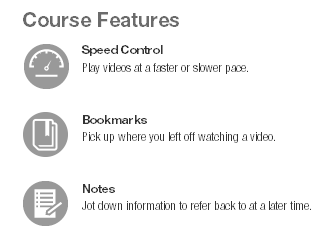CBT Nuggets-vCenter Orchestrator 5.5 Foundations for vSphere Administratorsseeders: 12
leechers: 9
CBT Nuggets-vCenter Orchestrator 5.5 Foundations for vSphere Administrators (Size: 723.99 MB)
DescriptionThis VMware vCenter Orchestrator 5.5 video training course with Greg Shields introduces the foundations of datacenter orchestration and automation using VMware solutions. It discusses topics that are specifically relevant to vSphere virtual administrators, walking the viewer through a real-world use case that can be immediately implemented in a production vSphere environment. Recommended skills: Familiarity with virtualization concepts Familiarity with VMware Workstation, VMware vSphere, and VMware vCenter Server Familiarity with basic installation of Windows Server 2012 R2 Recommended equipment: One or more desktop or laptop computers with a combined 16 GB of RAM One or more copies of VMware Workstation (latest version), VMware ESXi v5.5 or greater, and VMware vCenter Server v5.5 or greater SSD hard disks recommended Related certifications: None Related job functions: IT professionals Server administrators Virtual administrators Storage administrators Network administrators Ever wanted a self-service VM provisioning tool that was actually useful... because you created it? You can have one with vCenter Orchestrator and the skills you'll learn in this course. vCenter Orchestrator 5.5 is a powerful tool for automating IT tasks. Using Orchestrator's graphical workspace, you’ll connect pre-built activity objects to quickly construct complex automation tasks. Almost no scripting is required. Once built, those tasks can be executed and/or scheduled from within the vSphere client, a customized Orchestrator web site, or other triggering mechanisms. The hardest part about using Orchestrator is knowing where to start. This tool can be overwhelming. In this short "Foundations" course, veteran CBT Nuggets instructor Greg Shields offers a quick introduction to a handful of Orchestrator's most-useful features for vSphere administrators. You’ll participate in a real-world exercise that’ll leave you with a Orchestrator-driven, production-ready, self-service provisioning tool that you can immediately implement in your vSphere environment. 1. Installing vCenter Orchestrator (00:29:43) A vCenter Server license is all you need to begin working with vCenter Orchestrator. Orchestrator arrives in both a downloadable appliance and a Windows-based installation. This Nugget kicks off the course with an exploration of Orchestrator's Windows-based installation. You'll explore the Orchestrator configuration interface, integrate Orchestrator with Active Directory, vSphere, and vSphere SSO, install Orchestrator plug-ins, configure certificates, and prepare Orchestrator for automation. In this Nugget, Greg also outlines the self-service provisioning solution you'll be building during this course. 2. Executing and Scheduling Workflows in the vSphere Client (00:13:40) vCenter Orchestrator workflows can be executed and scheduled directly within the vSphere Client. Orchestrator at installation adds a large number of pre-built workflows that can be immediately used to manage vSphere and virtual machine configurations. This Nugget explores the basics of how these workflows are found and executed in the vSphere client. Watch Now! 3. Introducing the Orchestrator Client (00:14:58) Designing and customizing new workflows requires the use of an altogether new client, the Orchestrator Client. In this Nugget, you'll explore the Orchestrator Client's interface, get to know its Run and Design modes, and get introduced to the scriptable tasks, actions, and workflows that you'll soon be stringing together to create complex automations. 4. Constructing a Basic Workflow (00:26:48) With the introductions done, this Nugget digs directly into the creation of some basic workflows that require no coding or scripting, but instead make creative use of the built-in workflows provided by VMware. Greg explores how to connect multiple workflows together to begin creating a self-service VM provisioning solution that you can create in your own vSphere environment. 5. Configuring Presentation (00:20:59) One smart feature of vCenter Orchestrator is its separation of workflow code from presentation logic. That separation lets you create wildly powerful workflow activities that are later constrained by presentation rules. Need to make sure computer names aren't greater than 15 characters? Want to limit self-serving admins from deploying VMs to local storage? Need to constrain RAM values to multiples of four? All this and more is possible when you're building your own wizards that obey Orchestrator's presentation logic. Watch Now! 6. Adding Looping to Workflows (00:17:36) Early editions of vCenter Orchestrator weren't equipped with an easy way to loop through activities. The process required defining and decrementing counter variables in a literal loop of activities. vCenter Orchestrator 5.5 now supports a ForEach element that greatly simplifies the job, but it isn't without its limitations. You'll explore the ForEach element in this Nugget, along with a look at the situations where it works (and doesn't work) best. 7. Integrating Active Directory Activities (00:36:26) vCenter Orchestrator workflows needn't manage vSphere resources alone. Orchestrator is designed to automate all manner of datacenter activities, including Active Directory administration. This Nugget explores a few of the Active Directory tasks your self-service provisioning portal might need. It also discusses some of the data transformations Orchestrator activities sometimes require. You'll dig just a bit into the JavaScript scripting that'll convert string parameters into various complex objects. 8. Executing PowerShell Commands through Orchestrator (00:29:36) One of the biggest benefits of an automation solution like Orchestrator is being able to fully configure virtual machines at the moment they're provisioned. Doing so with Windows requires only a bit of PowerShell, and the Orchestrator PowerShell Plug-in. In this Nugget, you will learn how to install and configure the PowerShell Plug-In, add PowerShell script hosts, invoke PowerShell commands and external scripts, and finally how to generate actions for and from PowerShell scripts. 9. Customizing Orchestrator Webviews (00:23:34) Non-administrative users usually don't need full access to administrative tools like the vCenter Client or even the default Orchestrator Weboperator view. Thankfully it takes only a tiny bit of HTML coding to create your own custom Orchestrator webview. In this Nugget, you'll learn how to set vCO permissions on workflows, create custom webviews from the default_webview.zip template, configure webview elements and attributes, all with the goal of publishing your self-service provisioning portal for developers. You'll learn the export/import process for modifying webview HTML files, as well as how to enable web view development mode. Sharing Widget |


